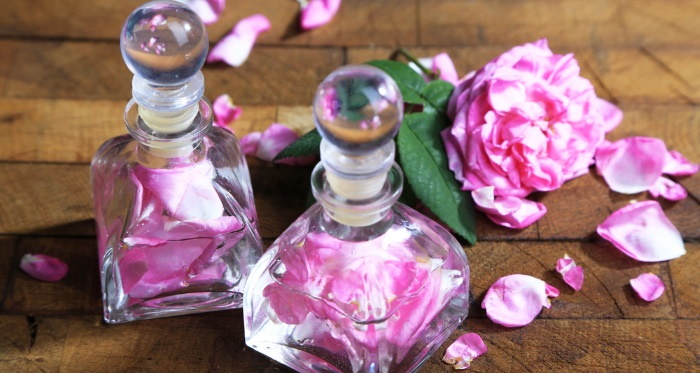Rose water is a worldwide beauty favorite with long-lasting appeal.
And with good reason.
It’s been used since ancient times. With the historical beauty queen Cleopatra bathing in it to condition her skin.
It can protect from aging and infections. While also soothing skin conditions and irritation.
And it’s found popular use these days as a toner and cleanser.
Not only that, but its famous scent can help to relieve anxiety and stress. And put you in a cheerful mood.
Are you convinced that you want to try it yet?
Let’s take a deeper look at the uses and benefits of rose water for skin.
Is Rose Water Good For Skin?
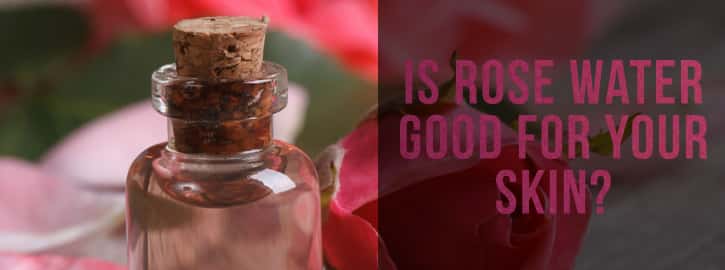
High quality rose water is made as a by-product of the steam distillation of rose petals to make rose essential oil.
During this process, some of the compounds in the rose oil stay in the water.
The water is then bottled for use, and you’ll often see it called rose hydrosol.
There aren’t a lot of clinical studies into rose water and its effects.
So what we know of its possible benefits mostly comes from looking at rose essential oil or the specific compounds that they both contain.
But, it’s worth realizing that these common compounds are not present in the same concentration in the water.
And consequently, its therapeutic effects might not be as noticeable.
Nonetheless, rose water remains a very popular beauty product.
And there are many anecdotal reports of its effectiveness for improving the condition of the skin.
Rose Water Benefits & Uses
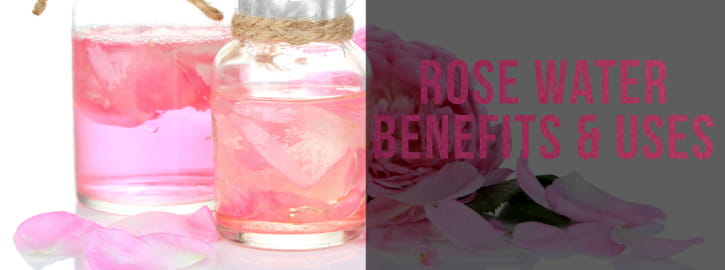
Anti-aging
Applying rose water regularly to your skin could help to keep it looking more youthful and beautiful.
Why?
Because it contains phenolic compounds that act as antioxidants.
These help to protect you from free radicals generated in your skin by toxins in your environment. And by UV radiation from the sun.
Their ability to scavenge and neutralize these charged particles could protect against age-related damage which causes wrinkles.
Also, rose extract has been shown in studies to have anti-collagenase and anti-elastase activity.
By inhibiting these enzymes it could help to protect the important structural proteins in the skin, collagen, and elastin (1).
PH Balance
The pH balance of your skin refers to how alkaline or acidic the surface is.
The pH scale runs from 1 (very acidic) to 14 (very alkaline) with 7 being a neutral pH.
Of importance, is a thin layer on the surface of your skin known as the acid mantle.
It’s consists of fatty acids secreted by your skin, mixed with lactic acid and amino acids from your sweat.
This layer provides protection to the skin and has a slightly acidic pH of approximately 5.5.
Unfortunately, many things can contribute towards its break down. Including environmental toxins, facial cleansers, soaps, and other beauty products.
This changes the pH balance of your skin, leading to problems.
Rose water also has a pH of around 5.5 and can help to restore the pH balance of your skin. Protecting the acid mantle.
Acne
By maintaining the pH balance of your skin, rose water also helps to protect against the acne bacteria P. acnes.
And the phenolic compounds it contains have antiseptic properties that could prevent bacterial growth on the skin.
However, the results on this are a bit mixed.
Studies that have looked into the antibacterial properties of rose oil have shown that it’s strongly antibacterial and can kill the acne bacteria (2).
However, in one study that examined the antibacterial activity of rose hydrosol, no significant antibacterial activity was detected against any of the bacteria used (3).
But, this study did not examine its effects on P. acnes.
Rose water also has anti-inflammatory properties. Which could be of use in preventing and treating inflammatory conditions such as acne.
Despite some of the mixed supporting evidence, there’s no denying that there are a lot of positive anecdotal reports.
And many people using it in their anti-acne regimen claim a significant effect.
We await controlled studies to see its full impact on this troublesome skin condition.
Sensitive Skin
Do you suffer from sensitive skin?
Pure rose water has a good reputation for being easily tolerated by this skin type.
It’s anti-inflammatory properties soothe the skin, reducing irritation and redness.
This is due to the phenolic compounds it contains.
Skin Conditions
That anti-inflammatory ability also makes it a candidate for treating other inflammatory skin disorders. Such as eczema and psoriasis.
Anecdotal reports suggest that it helps some people.
And scientific studies into rose oil suggest it might be useful for helping to control the texture and differentiation of skin cells in skin diseases. Improving the barrier function.
Toner
The fact that it’s so in balance with your skin goes some way towards explaining why rose water is such a popular toner.
It easily removes dirt, bacteria, and excess sebum from the pores and surface of your skin.
And it does this in an all-natural way without the use of any synthetic chemicals.
This means that rose water toners have become one of the go-to choices for the natural skincare enthusiast.
Astringent
Because rose water is a mild astringent it helps to temporarily contract the skin.
This can improve its appearance. Making it look smoother and tighter, and minimizing the appearance of pores and puffy eyes.
Sunburn
Cool water always helps to take some of the sting away when you’re experiencing sunburn.
But rose water goes one better.
Its anti-inflammatory properties help to soothe the pain and itchiness.
Makeup Remover
Are you looking for an all-natural makeup remover?
If so, consider giving rose water a try.
You can use it on its own. Or, you can make it even more effective by adding a small amount of coconut oil.
After you’ve applied the rose water to a cotton pad, add a few drops of the oil.
Then gently rub it over your face to remove makeup and dirt.
Skin Lightening
Anecdotal reports have suggested for years that rose water can help to lighten the skin.
And while studies to measure its effectiveness have not been conducted, there is some scientific evidence to support these claims.
One study looked at the ability of rose water to affect the enzyme tyrosinase.
Tyrosinase plays an important role in the synthesis of melanin, the pigment that gives skin its color.
Tyrosinase inhibitors are valuable to the cosmetic industry. And often appear in products for skin whitening and the reduction of hyperpigmentation.
The study showed that the polyphenols in rose water have the ability to inhibit tyrosinase (4).
Which could reduce the amount of melanin in your skin.
How To Use Rose Water
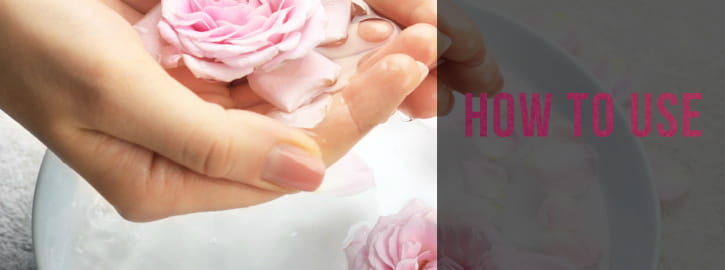
Rose water is a very versatile natural skin care product. And there are many ways to use it on your skin.
It can be applied using a spray bottle as a hydrating face mist. Refreshing you at any time of the day. Also useful to set makeup before you go out.
And by applying the water to a cotton pad you can use it to cleanse your face. Wiping away sweat, dirt, and bacteria. Freshening up your complexion.
You can also combine it with other natural ingredients to make a range of facial treatments and home remedies.
Here are a few of our favorite rose water recipes for you to consider:
Honey & Rose Water Face Mask

Honey has anti-inflammatory properties and a healthy dose of skin-protecting antioxidants.
It also helps to gently exfoliate the skin. Leaving it fresh and glowing. Removing fine lines. And helping with wrinkles.
Ingredients:
- Organic rose water
- Raw, organic honey
Directions:
- Mix 2 tablespoons of honey and 1 tablespoon of rose water together in a bowl.
- Apply to your face and leave on the skin for 15-20 minutes.
- Wash off and pat your face dry.
Aloe Vera & Rose Water
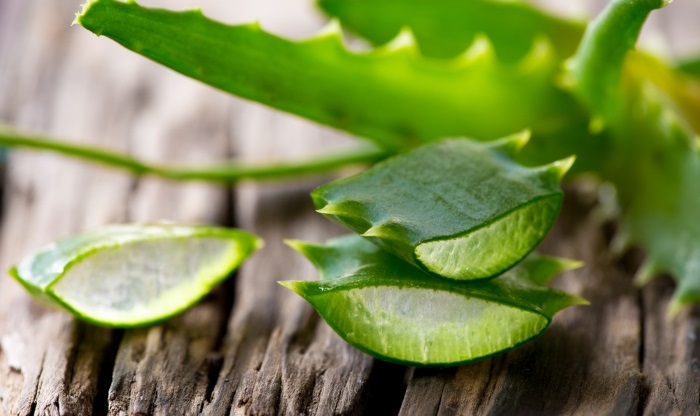
Aloe vera gel helps to moisturize the skin. It can also soothe inflammatory conditions such as acne, eczema, and psoriasis.
Ingredients:
- Organic rose water
- Aloe vera gel
Directions:
- Mix together 1 tablespoon of Aloe vera with 2 tablespoons of rose water.
- Rub the mixture into your skin and leave on your face for 20 minutes.
- Wash the rose water and gel mixture off with water. It can be left on your face if it has absorbed well, it depends on your comfort.
Witch Hazel & Rose Water Toner
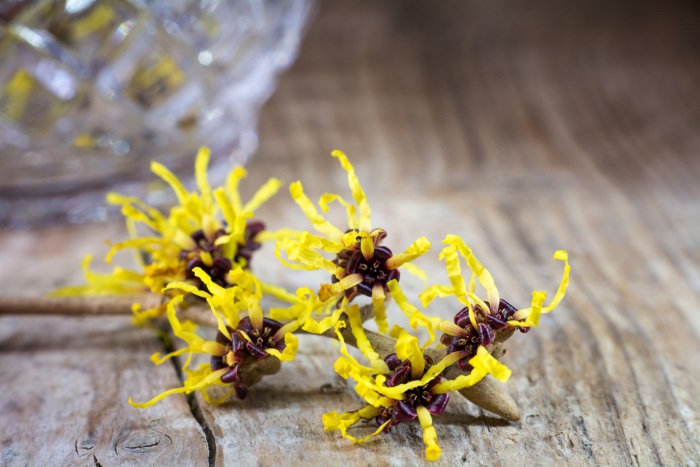
Witch hazel has astringent properties that help to shrink pores, and it contains antioxidants.
Ingredients:
- Organic rose water
- Bottle of witch hazel
Directions:
- Mix together ¼ cup of rose water with ¼ cup of witch hazel for combination or oily skin.
- If you have dry skin, then try using 3 parts rose water to 1 part instead.
- You can also add several drops of your favorite essential oil at this point if you wish.
- Use a cotton ball or pad to wipe the toner over your face.
Related Questions

Can rose water clog pores?
No, it’s non-comedogenic. It consists of water and a small amount of the phytochemicals that are found in rose petals. It can be used safely to cleanse your skin.
Does rose water help dark circles?
Dark circles under the eye are caused by a number of different factors. Including tiredness, allergies, pigmentation, and changes in the fat layer underneath your skin.
So it depends on what’s causing it for you.
As mentioned above, rose water has the potential to help with areas of pigmentation due to its ability to interfere with melanin synthesis.
So if this is the cause then it might help.
But not everyone will find it useful.
Can I leave rose water on my face overnight?
Yes, it can be left on your face at night without any problems.
Have you tried using rose water? Share your experiences in the comments!

